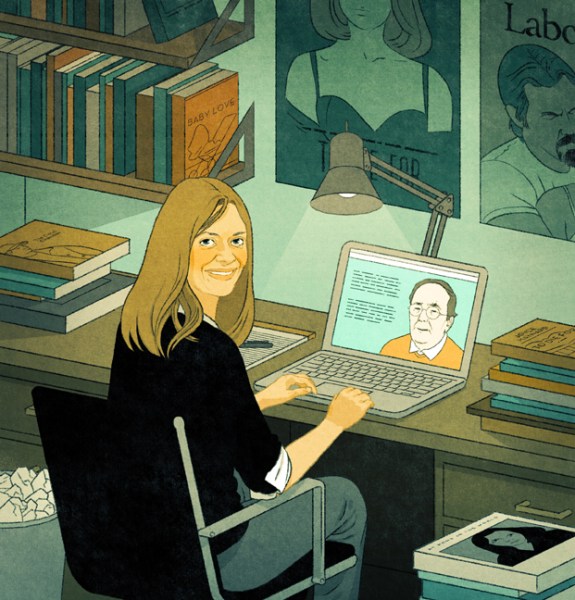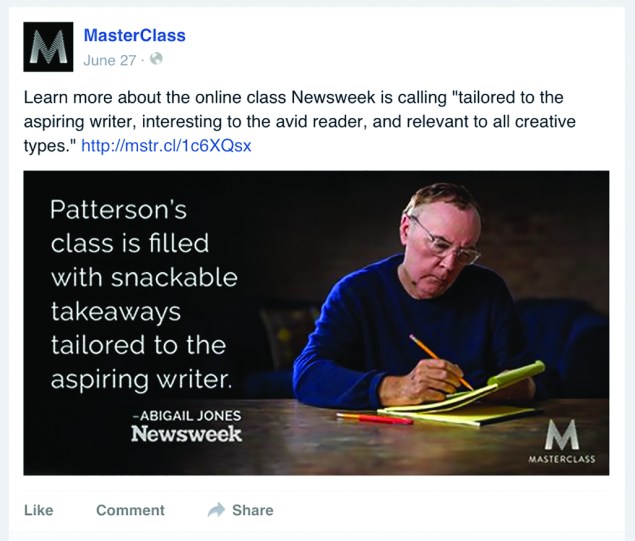
The MasterClass ads started popping up in my Facebook feed a couple of weeks ago. Evidently I fit the demographic of a person who might be willing to cough up 90 bucks for three hours of online lessons taught by a famous person, imparting wisdom on how he or she got that way and how, presumably, I might even do the same, once I mastered the lessons in the MasterClass.
Knowing how scarily well Facebook appears to understand my life, it is unlikely that anyone there (man, or machine) saw me as a candidate for the Serena Williams MasterClass in Tennis, or the Usher MasterClass in the Art of Performance. Back in 11th grade, I played Lady Macbeth in the Oyster River High School production of Macbeth, but I doubt Facebook was aware of this fact, or had me pegged as a possible buyer for the Dustin Hoffman MasterClass in Acting.
It was the James Patterson class they must have recognized as right up my alley—the one titled James Patterson Teaches Writing—a class described as offering advice on how to write a best seller. No doubt this one was offered to me because I am a writer, myself. Just not the type whose name tends to show up on the bestseller list.
I, too, could be one of those writers whose books the person on the seat next to you on the airplane always seems to be reading.
In the 42 years I have worked full time—day in, day out—as a writer, producing, so far, 15 books (a couple of memoirs, a collection of essays and a bunch of novels). I have made it onto The New York Times list for a lifetime total of four weeks—back when the movie version of my novel Labor Day sent the novel that inspired it very briefly onto the charts. Other than that one heady moment, I have labored, like most of my writer friends, in one level or another of financial challenge. But I have held onto the undying faith that any day now, things might change, and all those readers out there who have been buying books by people like Jodi Picoult and James Patterson would suddenly realize what they were missing, and pick up one of mine, instead. And then I, too, would be one of those writers whose books the person on the seat next to you on the airplane always seems to be reading.
Meanwhile, I continue to drive a 1995 Honda Civic and clean my own bathroom. And, in my ungenerous moments, I confess to having harbored a certain not-particularly-attractive level of bitterness over the success of writers like John Grisham and—above all others—James Patterson, a man who holds the title as the world’s best-selling author, publishing so many novels a year that he needs a whole stable of collaborators just to keep up with the demand.
But when this MasterClass announcement showed up in my feed, a new thought came to me. I could hate the man for selling so many more books than I do. Or I could humbly acknowledge that maybe the guy knows something I don’t, and sign up for his class. Which I did.

Confession: At the time I plunked down my $90 for James Patterson’s class, I had never actually read a novel by James Patterson. This didn’t keep me from having a low opinion of the man’s oeuvre. He was pandering to the masses, I told myself. Churning out schlock.
But here’s where another voice piped up in me. Over my many years of publishing my work (novels that may sell 5,000, or 10,000, or if I’m really on a roll, 20,000 copies, to James Patterson’s millions), one thing I’ve acquired is respect for readers. Readers may not be the ultimate arbiters of what makes great art, but they can sense a good story, and even more so, sense when something is inauthentic or written from a place of cynicism or contempt. If a writer approaches his or her story with the simple goal of selling a lot of books, the reader is likely to smell it, and stay away. Something in the work of James Patterson has kept readers ponying up their dollars over the course of a career that now includes 76 best sellers. Maybe I could learn a thing or two about what this quality might be. Maybe I could even acquire it?
So the other day I sat down to the first of the 22 lessons in the James Patterson MasterClass.
Now, just to be clear, I didn’t get to confer personally with my instructor. I also didn’t have to drive anyplace, or show up at a specified time. Paying the fee gave me access to an extremely well-designed website where, at any hour of day or night, I might tap into James Patterson’s lectures—pausing when I wanted, to work on one of the assignments that accompanies each lesson, in the hope that my words might even catch the eye of James Patterson himself. I could have taken as long as I wanted to absorb those 22 segments, but given that I’m not getting any younger here—and that 42 years is an awfully long time to have one’s books not showing up the bestseller list—I decided to get on with it.
I could hate the man for selling so many more books than I do. Or I could humbly acknowledge that maybe the guy knows something I don’t, and sign up for his class.
Just over three hours later, I officially graduated. And though I entered into this project with a large measure of skepticism—worse, even: I entered anticipating that his lessons might offer up some great comedy material—by the time the last lesson was over, and Mr. Patterson (Jim, to me, now) had set me loose to write my best seller, I had developed genuine respect for the man. Even affection. If I met him at a book festival some day, and the opportunity arose, I’d greet him like an old friend.
What changed? For starters, Mr. Patterson possesses an abundance of good, solid common sense and some genuinely valuable wisdom. Not necessarily about the art of writing, mind you. But about storytelling. And at the end of the day, if you ask me (and more importantly, if you ask readers and book buyers), that’s what matters most. A person can write the most beautiful, lyrical sentences (as James Patterson will be the first to tell you, he does not), but if the story doesn’t grab a reader by the throat, and—having grabbed on—hold her there, none of the rest may matter all that much.
Some of the topics Mr. Patterson covers in his MasterClass: Where he gets his ideas. How he designs his characters—and what makes a character compelling. Villains. Creating tension. Dialogue. Here he goes into some detail about the importance of writing dialogue that doesn’t sound like real life—which would be tedious. But rather, writing dialogue that’s wittier, tighter, more filled with dramatic tension and suspense, than what actually happens around the dinner table, or anyplace else in the real, not-particularly-exciting lives people try to escape when they pick up a James Patterson novel.
My friend James Patterson is a big believer in the importance of a great outline. These days, in fact, the outline may be the main thing he actually writes, while he turns over the actual writing to his stable of co-authors. This is how he manages to turn out three or four novels a year, and still fit in a few holes of golf most days.
Still, James Patterson believes in hard work. Seven days a week, in his case—though Mr. Patterson doesn’t call writing work, because he loves it so much. This is a man with an unmistakable passion for what he does.
Some other things James Patterson believes in: Research. Surprises. Action. (If a story isn’t galloping along, it’s sinking. Fast.) He’ll tell you that your first sentence had better be a killer. And that every page needs to contain a measure of drama and intrigue; suspense and excitement that keeps the reader in her chair. (I say “her chair” because it turns out that the vast majority of James Patterson’s millions of readers are women. A fact I might not have anticipated.)
James Patterson came to writing from the world of advertising, and he remains (as I, sadly, am not) a businessperson. “Don’t set out to write a good thriller,” he says. “Set out to write a No. 1 thriller.”
It’s a refreshing aspect to the man, that he harbors no illusions about his gifts. “Let’s face it,” he tells us. “I’m not writing War and Peace.”
“I’m not that concerned with style. …Don’t think about the sentences,” he advises. Just keep that train roaring along.
His stories may be unlike anybody else’s, but his MasterClass is hardly free of clichés: Writing is “a great ride.” A character’s dialogue “fits him like a glove,” and above all else, we should avoid “two-dimensional characters.” A big plot development is “an ‘aha’ moment.”

Never mind all that. The man understands dramatic storytelling. When he tells us to write in such a way that our words “turn on the movie projector” in a reader’s head,” I could not be more with him. I even say the same thing, almost word for word, to my own writing students, in the classes I teach, whose modest enrollment numbers (I now realize) probably have something to do with the fact that not once in all the years I’ve taught writing, myself, have I ever promised I could help anyone write a best seller.
Can James Patterson’s MasterClass accomplish that? Not if a person doesn’t have some natural instincts. (And from the writing samples submitted online by some of my fellow students, I can attest to how many do not.) The MasterClass has not been created—nor will it be—that can impart talent, or originality, or simply a good ear.
Still, James Patterson’s MasterClass is in no way a rip-off. Even if a person never finishes her novel, or finds an agent, or gets her work published, James Patterson will no doubt leave her feeling fired up to write a story. It will inspire people, and make them happy. It will not put them down. What James Patterson is selling here, as much as anything is a glimpse at the dream, and the feeling that it might actually be possible. (Among the segments in the MasterClass is one covering that age-old dilemma: “What to do when you sell your novel to Hollywood.” Now there’s a problem…)
As my friend Jim says, we should reach for the stars. There are worse things an individual might do than to nourish hope and enthusiasm for creative expression, or simple entrepreneurship. James Patterson is great at that. For the three hours it takes to listen to all 22 segments of his MasterClass, students may actually get to feel like writers. They can even post a few sentences of their work up there, and if they are among the lucky ones, James Patterson himself may actually offer up a response. One woman wanted to know how she might protect herself from the danger that someone, seeing her writing on the site—including Mr. Patterson himself, perhaps—might rip it off. Having seen her work, I might have told her not to worry.
See how mean I can be? James Patterson would never say anything like that to one of his students, or dampen, in any way, their aspirations. To James Patterson, any one of us out there taking this class may be the next James Patterson. And if we aren’t… well, you don’t have to become Jimi Hendrix to get some joy out of fooling around on the guitar. And let’s not forget, Buddy Holly only played three chords.

